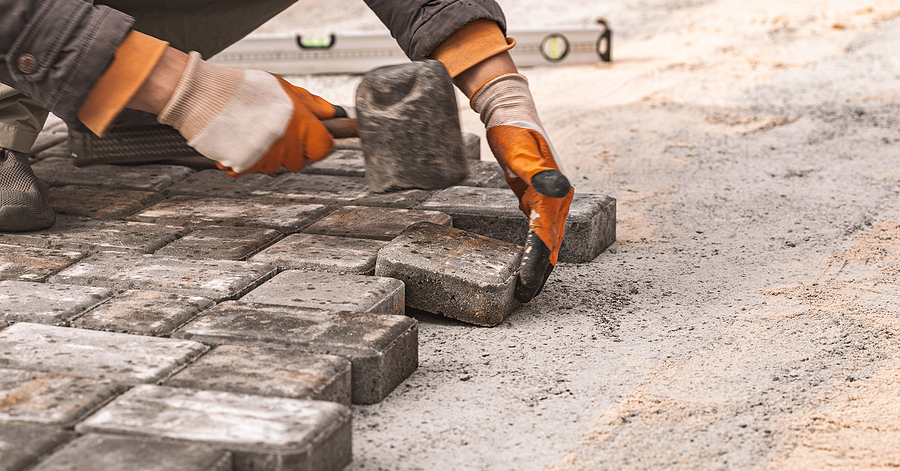Your driveway is the first thing people see when they drive up to your home. It is the ultimate curb appeal element, but it rarely gets the attention it deserves.
Many Long Island homeowners just want a place to park their car or get to the garage. But because your driveway represents a substantial investment in your home and contributes to the overall appearance of your residence, you should consider your paving alternatives carefully.
Both asphalt and stone driveways are popular in the Northeastern United States. But which paving material is best for Long Island driveways, asphalt or oil and stone?
Let’s look at the benefits and disadvantages of each.
Oil and Stone
Oil and stone is one of the earliest paving methods developed. It’s popular in the Northeastern United States.
The driveway is constructed on a properly compacted, prepared, base with good drainage. Next, bituminous oil is distributed over the driveway area. Bituminous oil is an all-natural by-product of petroleum refining.
After the layer of oil is in place, small gravel is spread. A compactor presses the stones into the oil layer. As the oil dries, it hardens and keeps the stones in place.
Advantages
An oil and stone driveway gives a distinctive rustic look to a home. So, it adds immediate curb appeal. The color of the driveway is determined by the color and type of stone used. So, you have a choice in the color of your driveway.
Oil and stone driveways are durable and can last 10 to15 years when properly maintained. There’s no need to seal the surface. As the bituminous oil softens in the summer heat, it surrounds stones that may have become loose. Every 2 to 3 years, more stone may need to be added.
If your driveway is used as a parking surface, oil and stone works great. The rough surface provides superb traction.
Disadvantages
As great as an oil and stone driveway may look, they aren’t for every Long Island driveway. They do have clear disadvantages.
If you have children, the rough surface of an oil and stone driveway doesn’t provide a smooth or safe playing surface. They won’t be able to roller skate, skateboard, rollerblade, or even play basketball. When a toddler falls, the rough surface scuffs up knees and shins more than a smooth asphalt surface.
While the stones look great, they don’t stay in place particularly well over time. If your driveway is steep, you’ll want to pass on oil and stone. Even with a moderate slope, homeowners must go out at least twice a year and rake up the loose stone and redistribute it.
While our Long Island winters aren’t brutal, we still must deal with snow and ice. An oil and stone driveway can’t be plowed without dislodging the stones, so it is hard to clear when the weather turns bad.
Asphalt
Asphalt is one of the most popular materials for Long Island driveways and driveways across the United States.
Like an oil and stone driveway, the construction process begins with properly preparing the base. This ensures the driveway is stable and drains properly. Once the base is complete, a binder layer of large aggregate, sand, and oil is spread. On top of this, another layer of asphalt made with much smaller aggregate, sand, and oil is spread. Once dry, you have a driveway with a smooth, hard, black surface.
Advantages
The simplicity of the black asphalt surface matches any architectural style and adds instant clean-looking curb appeal.
Because asphalt surfaces are smooth, they create a safer space for children to play. So, this type of driveway can be used for basketball, skating, skateboarding, rollerblading, and most any other type of play.
Asphalt driveways are very affordable. They cost more than a gravel driveway, but when properly maintained, a Long Island asphalt driveway lasts up to 20 years.
They don’t require yearly maintenance.
Disadvantages
While asphalt driveways are beautiful, smooth, and durable they do have a few drawbacks.
Most disadvantages center on maintenance. Asphalt surfaces are damaged by water. This means any holes and cracks must be filled right away. Maintenance cannot be deferred.
To keep the asphalt watertight, it must be sealed every 2 to 5 years. This maintenance also cannot be deferred.
In addition, asphalt surfaces can be hot underfoot in extreme temperatures. Children and adults will want to wear shoes and avoid going barefoot on the hottest summer days.
Which Is Best – Oil and Stone or Asphalt?
So, which paving material is best for your Long Island driveway?
It boils down to the slope of your driveway, how you will use the surface, and your budget.
If you don’t have a steep or long driveway and will use the surface for parking cars and not for children playing, oil and stone is a budget-friendly choice.
However, if you need to keep your driveway plowed and use it for more than parking cars, you’ll find an asphalt driveway is the most economical choice. It costs much less than concrete and rivals it when it comes to durability.

